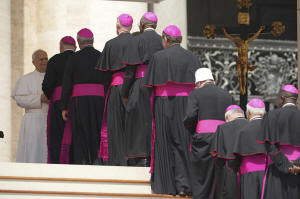Pope Leo XIV names first Chinese bishop, signalling he is continuing
Vatican's controversial accord
[June 11, 2025]
VATICAN CITY (AP) — Pope Leo XIV made his first
appointment of a Chinese bishop under the Vatican’s 2018 agreement with
Beijing, signalling he is continuing one of Pope Francis’ most
controversial foreign policy decisions.
The Vatican expressed satisfaction that Leo’s June 5 nomination of
Bishop Joseph Lin Yuntuan as auxiliary bishop of Fuzhou was recognized
Wednesday by Chinese authorities.
The Vatican said in a statement that Lin taking possession of the
diocese and the civic recognition of his appointment “constitutes a
further fruit of the dialogue between the Holy See and the Chinese
authorities and is a significant step in the diocese’s communal
journey.”
Francis had riled conservatives when he approved a deal in 2018 over
bishop nominations, which had been the most divisive issue in
Vatican-China relations since diplomatic ties were severed when the
Communists came to power. China had insisted on an exclusive right to
name bishops as a matter of national sovereignty, while the Vatican
asserted the pope’s exclusive right to name the successors of the
original Apostles.
China's estimated 12 million Catholics have been divided between an
official, state-controlled church that didn’t recognize papal authority
and an underground church that remained loyal to Rome through decades of
persecution. The Vatican tried for decades to unify the flock and the
2018 deal was aimed at healing that division, regularizing the status of
seven bishops who weren’t recognized by Rome and thawing decades of
estrangement between China and the Vatican.

[to top of second column]
|

Pope Leo XIV meets bishops during his weekly general audience in St.
Peter's Square at The Vatican, Wednesday, June 11, 2025. (AP
Photo/Andrew Medichini)

The details of the 2018 deal were never released, but it affords the
state-controlled church a say in its church leaders, though Francis
insisted he retained veto power over the ultimate choice.
The deal has been criticized by some, especially on the Catholic
right, for having caved to Beijing’s demands and sold out the
underground faithful in China. The Vatican has said it was the best
deal it could get and has been renewed periodically since then.
One of the big foreign policy questions facing Leo, history's first
American pope, was whether he would continue renewing the accord or
heed conservative demands and make some changes.
There have been apparent violations on the Beijing side with some
unilateral appointments that occurred without papal consent. The
issue came to a head just before the conclave that elected Leo pope,
when the Chinese church proceeded with the preliminary election of
two bishops, a step that comes before official consecration.
All contents © copyright 2025 Associated Press. All rights reserved |